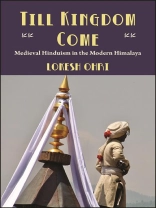Hinduism, as is well known, has taken a multitude of shapes and forms. Some Hindu ‘little traditions’ have remained obscure or understudied to this day due to their regional remoteness. One such offshoot is the influential cult of Mahasu, which has existed since medieval times in a part of the western Himalaya. The deity at the core of the cult takes the form of four primary Mahasus with territorial influence, installed in various far-flung temples. Their geographical center is the village of Hanol, and the larger territory is integrated into the Mahasu politico-religious system by a peripatetic deity with loyal followers across a considerable domain.
Mahasu remains influential in the region, its ritual practices having remained quite distinct despite social change. An anthropological survey was conducted in its terrain during British times, but
Till Kingdom Come is the first book to offer a detailed framework, a fine-grained history, and an analytically nuanced understanding of one of the rarest branches of Hindu worship.
Tabla de materias
Acknowledgements
Glossary
Note on Transliteration
1. Introduction: Kings Divine
2. Ritual Longevity
3. Journeying Sovereignties
4. Stranger Kings
5. Being Young
6. Emerson Emerges
7. Duty Bound
8. Tribal Caste
9. Rites and Rights
10. Conclusion: Change and Continuity
Bibliography
Index
Sobre el autor
Lokesh Ohri is an anthropologist and activist who has worked for several years in the Himalaya. He was a doctoral fellow at the South Asia Institute, University of Heidelberg, Germany, and has worked on political rituals, heritage, and resource use in the mountains. He is currently working on an extensive documentation of the river Ganges from source to mouth.












